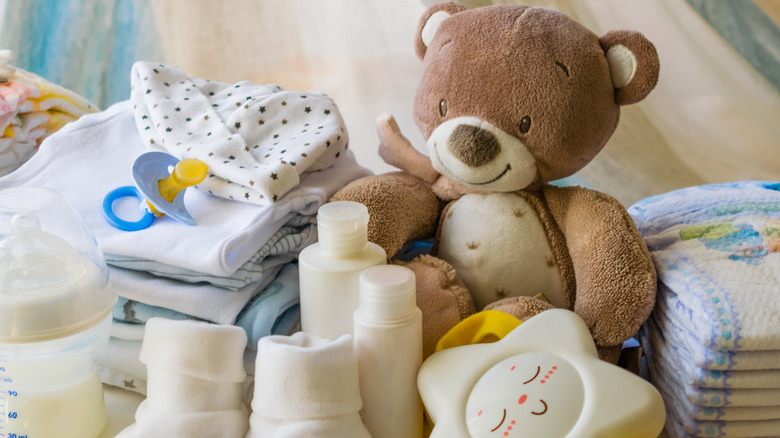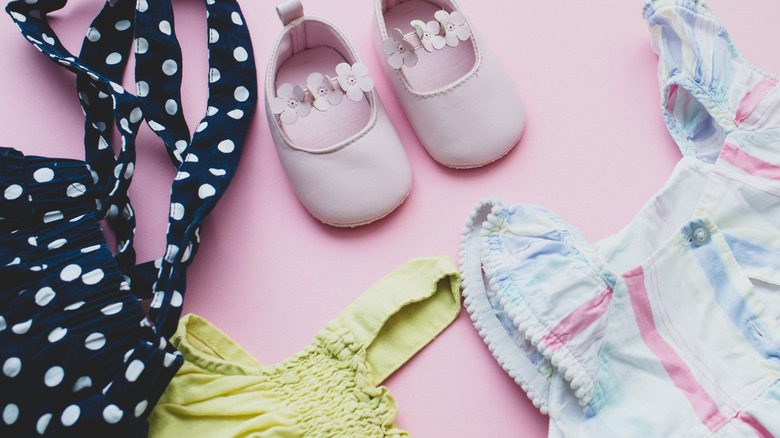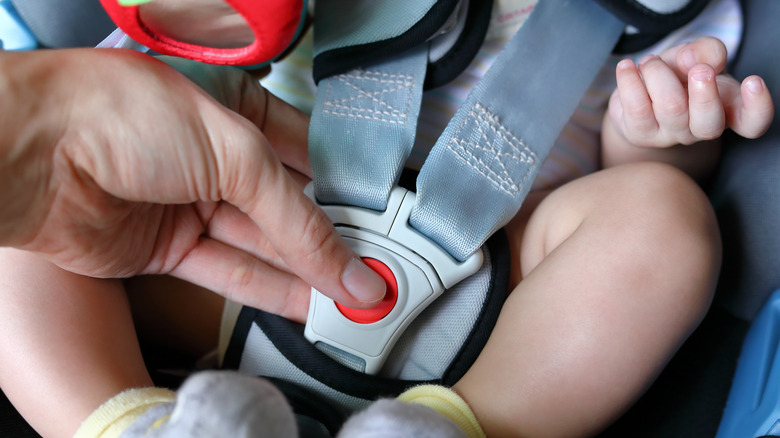Baby Items You Should And Shouldn't Buy At A Thrift Store
One of the things you soon find out, shortly after giving birth, is that babies are super-expensive! Worth every penny and then some, true, but... wow, there's just so much stuff that goes along with caring for an infant — stuff that is really only going to be used for perhaps a few short months before being outgrown as your baby turns into a toddler. Unless you had a really amazing baby shower à la Kim Kardashian, or you're on your second or third (or more) kid by now, and have tons of stuff left over from baby's older sibs, you might be tempted to hit up the thrift store to pick up some of those baby essentials.
While thrift stores might be a great place to stock up and save a few (or a lot of) bucks, still, not all the baby gear there is going to be worth buying, and it can even be unsafe to do so. Check out this list for some tips on what baby items can be thrifted, and which ones you're better off buying new.
Baby items to buy secondhand
Baby clothes are a thrift store no-brainer. These are outgrown so quickly, there's a good chance you'll be able to find a ton of stuff in a range of sizes that's barely been worn at all. Parents magazine also suggests secondhand baby shoes as a best buy — unlike adult-sized shoes, baby shoes found at the thrift store may exhibit little or no signs of wear. Not only do baby feet grow super fast, but most babies aren't really out there pounding the pavement for hours a day, so this is a perfect way to grab a cute little pair of shoes that your baby, like the shoes' previous owner, will only don briefly before outgrowing. You can stock up on baby essentials, such as onesies and baby socks, but also look out for good deals on super cute clothes that would work for your baby's first photo shoot.
Soft toys and play mats can also be an OK baby buy (via Thriftshop Chic) — just check to make sure there are no broken parts or anything that might present a choking hazard — oh, and you're definitely going to want to throw them in the washer and dryer before handing them over to your tiny tot, since the only dried drool you want baby chewing on is their own.
Certain types of furniture — rocking chairs, changing tables — should not present any safety hazard to baby if purchased used, but you'll want to make sure every bolt is in place before plopping yourself or your baby on one. Secondhand hard plastic baby tubs, which are another rapidly outgrown item, are also perfectly usable.
Baby items you should leave at the thrift store
Used cribs are not recommended, as older cribs may not meet modern safety standards — particularly drop-sided cribs which have been implicated in not just injuries but deaths. Even if you find a newer thrift store crib, there may be problems with the crib hardware or how it was assembled, so thrift-store cribs are a definite no. Car seats, as well, are an item that should never be purchased used. Once they've been in an accident — and how would you know? — they are no longer considered safe. If you cannot afford to buy a new car seat, there are numerous resources for providing these to low-income families (via Car Seats for the Littles).
Used strollers and high chairs fall into a gray area — if they are newer models, with little damage, and all of the straps and connectors look secure, you could give them a try, but note that it's always a good idea to do a search at the Consumer Products Safety Commission to see if the item you're checking out has been subject to a recall in the past, no matter what it is. Bear in mind with high chairs, though, that these must have five-point safety harnesses and fixed center crotch posts, and that the trays should neither be removable nor adjustable to a point where they can be above baby's head
A basic rule to follow, when thrift shopping for baby, would be: if it's small, soft and washable, you're good to go. For larger items, check them out carefully, and give them a miss if there's anything that seems off. If it's a crib or a car seat, definitely just say no. Nothing, after all, is more important than your baby's safety.


